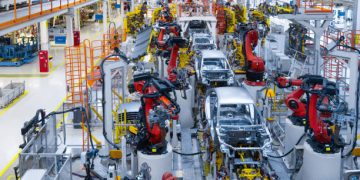By supplychainreport
The U.S. administration has announced changes to its auto tariff policy aimed at reducing the financial burden on automakers operating domestic facilities. The move comes in response to industry concerns about increased costs, consumer prices, and supply chain disruption.
Under the revised policy, companies manufacturing vehicles in the United States will be eligible for reduced import taxes on foreign parts. The tax relief will be calculated based on sales volume and vehicle pricing, providing temporary flexibility for businesses as they adapt their supply chains. The adjustment is set to remain in effect for two years.
Officials emphasized that the policy is designed to help automakers during a transitional period, while also avoiding overlapping tariffs on components such as steel, aluminum, and goods from trading partners including Canada and Mexico.
The announcement coincided with the president’s visit to Michigan, a state with a significant automotive footprint including major players such as Ford, General Motors (GM), and Stellantis. These companies had previously voiced concerns over the initial tariffs introduced in March, which had prompted a surge in consumer demand and left manufacturers reassessing their operations.
General Motors, in a statement, welcomed the revised measures. “We appreciate the productive conversations with the Administration and look forward to continued collaboration,” said CEO Mary Barra. GM also noted the need to revise its full-year forecast and postponed an earnings call with analysts.
Ford echoed the sentiment, stating the policy shift would “help mitigate the impact of tariffs on automakers, suppliers and consumers.” The company reaffirmed its support for initiatives that promote domestic production while maintaining supply chain affordability.
As part of the updated framework, automakers will be eligible for a tariff “offset” of up to 3.75% of the suggested retail price for vehicles assembled in the U.S. in the first year, dropping to 2.5% in the second year. Vehicles comprised of at least 85% U.S., Canadian, or Mexican parts will be exempt from the duties altogether, with that threshold increasing to 90% in the second year.
Industry leaders acknowledged that today’s vehicle production heavily relies on global supply chains. The revisions are seen as a recognition of this reality, providing companies with time and flexibility to adjust.
Stellantis Chairman John Elkann stated, “We look forward to our continued collaboration with the U.S. administration to strengthen a competitive American auto industry and stimulate exports.”
The updated tariff policy follows a letter sent by a coalition of industry groups urging relief from impending duties. The letter, supported by companies including GM, Toyota, and Volkswagen, warned that the measures would result in higher consumer prices and increased service and repair costs.
#SupplyChainNews #AutoIndustryUpdate #TariffRelief #ManufacturingInUSA #USAutoSector















